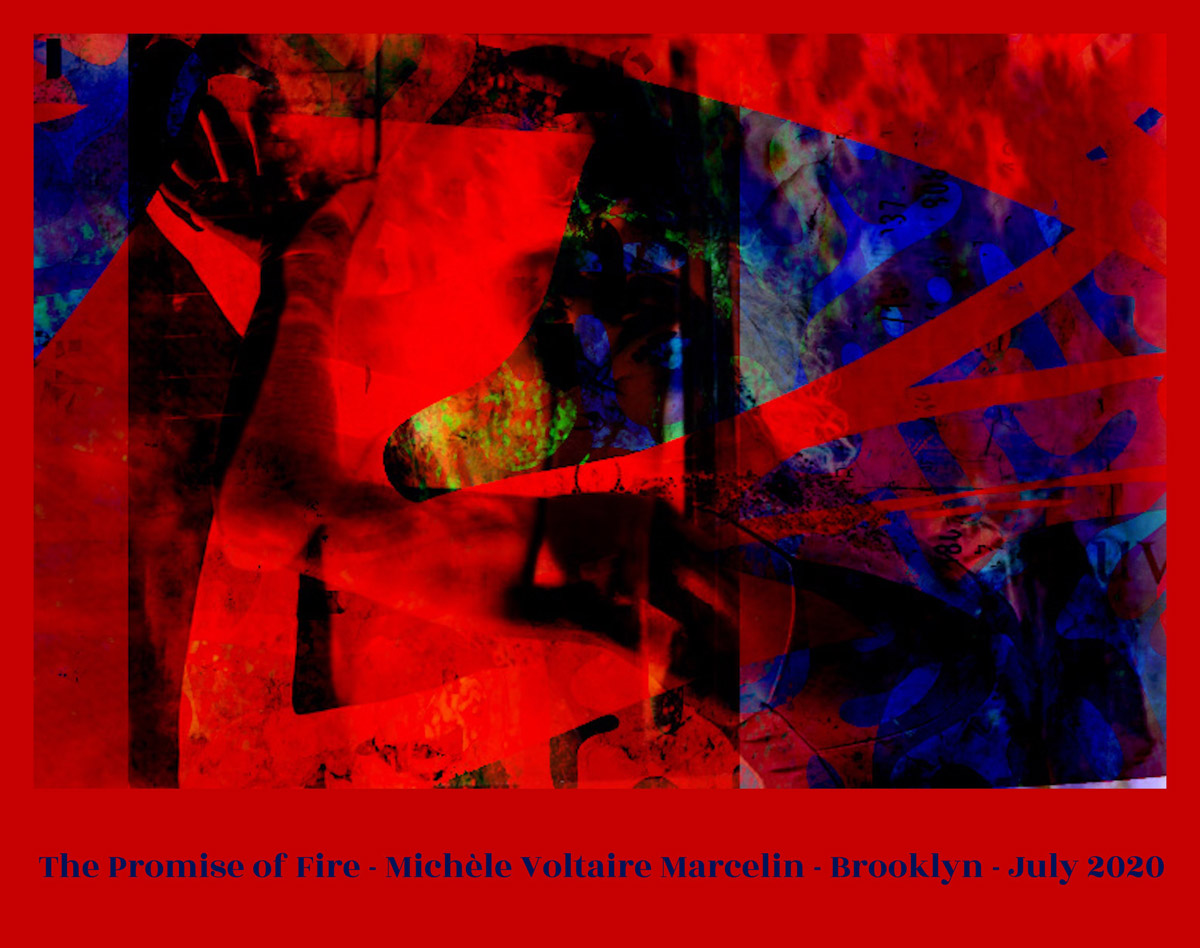Poetry in English
Poems by Aidan Rooney from “Menagery”
1. Two Parrots
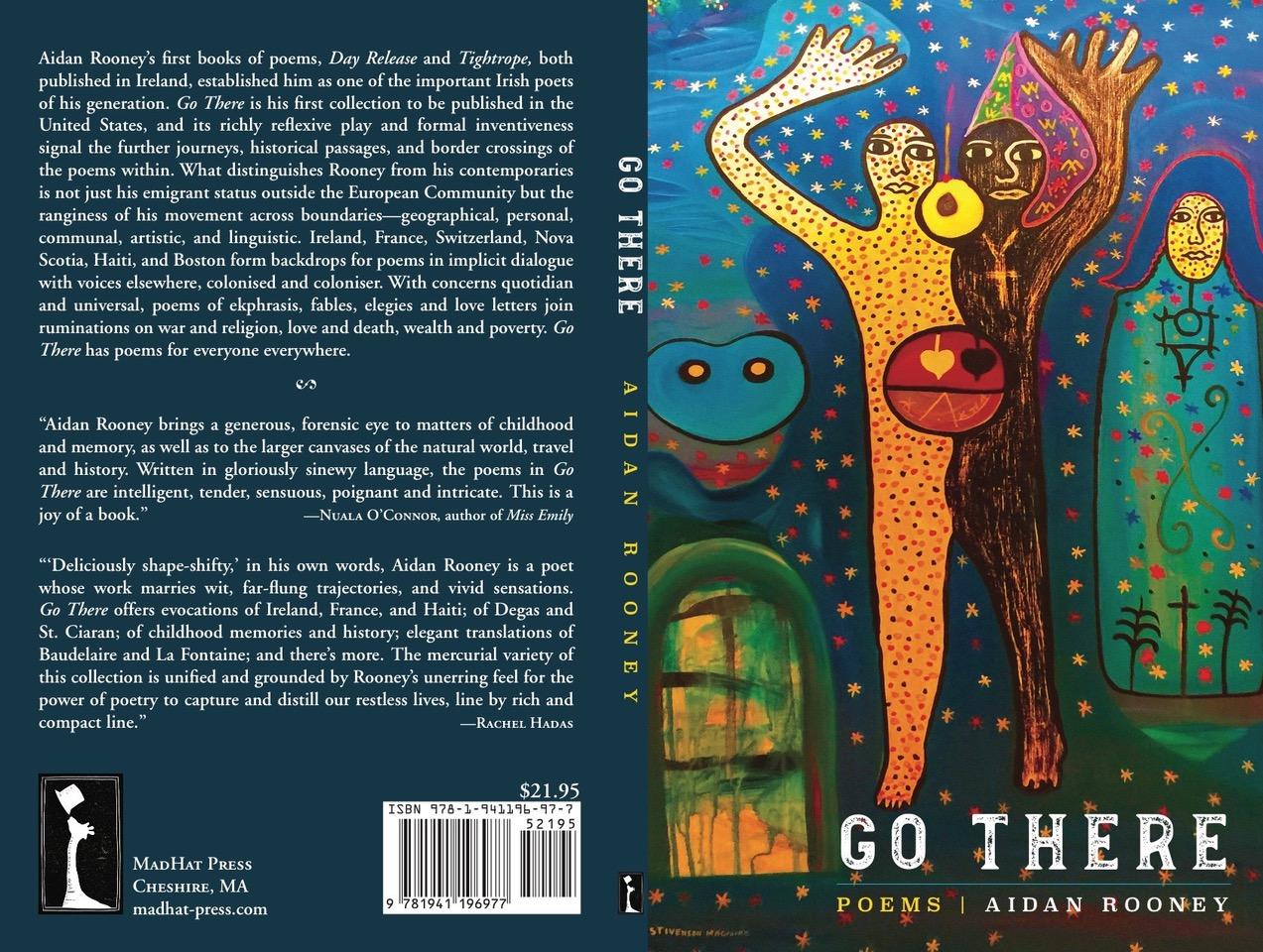
Go there, poems by Aidan Rooney.
(For Gerdette in Sydney, Australia)
Serious primary technicoloration,
sister, going on with those birds of yours, big swathes,
no messing around with the paint cans in that house.
Would you look at the blue head on them cocked at you,
the red chest, green wings, yellow ruffle and undergird.
Where would you be going out in a coat like that?
Do the tongues in those scarlet bills tell what they are told
or are they say-nothing cute, themselves to themselves?
Are they partners, your balcony breakfast buddies,
poking toast crumbs right out of your hand, the runways
pulling from under you? Have they no homes to go to?
2. Roosters
(For Darline in Diquini, Haiti)
Have you decided yet how to orient the bed,
bbm, to get that Diquini-sur-mer look lookout
to the sea, not one boat on it, a balcony
the doodling, dawn-challenged cocks see you look up from
to stars still shaking off Saharan blow-in sands,
and announce, no matter the hour, our lives matter,
with red headdresses to show for it, matching wattles,
spurs to keep kin safe and protect the hood they squat on,
roosters asking who is this beautiful silhouette
who now has her Galaxy out to take a shot
of lit night air, the rebar laid, the space taking shape?
3. Stray Cats
(For James in Bantry, Ireland)
I miss the two cats you put milk in a saucer for,
my distant, half-house neighbor, and place on the wall
that ties our back gardens, no flies on them, the white cat
with the black tail and lightning strike across her face
who will not sit on anyone’s sill, and the black one
with white belly who watched live without a whisker twitch
the looting in shops last summer in Port-au-Prince,
and the football team of boys freed from the Thai cave,
neither much a meower either, walking the wall
on felted stilts, knowers of firm and wobbly stones
and how to get around your fuchsia cambering.
4. Macaques
(For Shiva in Hyderabad, India)
Off gallivanting go the pink-faced macaques
with my unattended underwear, short shorts and shades
at the one of the seven pools that never runs dry
we’ve come to get a swim in in before sundown,
having the craic of their lives by the looks of it,
the macaque who nabbed my Adidas Climalite
presenting rump to the one who got the boxers
whilst the monkey with my favorite aviators
barks like an elephant from atop the temple wall,
giving everyone the bared-teeth silent treatment,
and trains the last of the sun on gold rims and dark glass.
5. Octopus
(for Erin and Oliver in London, UK)
Maybe because I’m a bit all over the place
and, much like the bowerbird, not much to look at,
but I’d like the idea of identity stretched,
suggests the octopus, to include one’s garden,
not to co-opt Voltaire, Rousseau, Ringo et al,
get all pedestrian neo-romantic, over-
subscribe to the safe space to rest the gloomy head
and lazy bones, but to articulate the charm
a sense of purpose has in times of sturm und drang
with sea debris and shiny stones, crab and scallop husks
selected from the ocean floor’s vast rococo scatter.
Go There
(after the Haitian Kreyòl of Tontongi)
Go there, where you know yourself
you should, before the sad sack
of your heart withers tighter
than the skin on a bodhrán.
Go there, even if you’re ticked off
at policy, even if you turn to salt
at the who’s-who, fundraiser feast.
You have to go there, brothers, sisters,
where nobody gives the destitute
the time of day, where no light lights
their day with hope.
Go there, bring your zeal to bear
on the happiness of other people.
Fight and right the wrongs
the world’s poor endure
as if they’d no business being here at all,
here where, with plenty, the splendor falls.
You have to go there, stay there, join us
if only with a soft smile on your mouth.
O my sisters, my brothers, we are needed there
to plant together, without any more shenanigans,
oranges and corn and friendship
for all of us on earth who need relief.
—Aidan Rooney
This poem is an English translation of Tontongi’s poem “Ale la” (see “Pwezi ann ayisyen”). It first appeared in Poetry Ireland Review, in 2013, in side-by-side translation. Tontongi’s original in Haitian was first published in the anthology Open Gate, the first bilingual anthology of Haitian poetry in English, edited and translated by Jack Hirschman, Paul Laraque and Boadiba, and published by Curbstone Press, 2001. This translation by Aidan Rooney is from his third collection of poems, Go There (whose covers are reproduced above), published by MadHat Press, 2020. Aidan lives in Hingham, Massachusetts, and teaches at Thayer Academy.
Poem by Alex Laguerre
Shadow zone
My despair is going to party on down
Among the Magnolia trees
And my poem
Defying the curfew
Roams,
Taciturne and barefoot
Striding along on all the streets
Of the city.
—poem of Alex Laguerre translated by Elizabeth Brunazzi, a poet, translator and educator who lives in New Mexico.
Poem by Everett Hoagland
Together
Alone so long
with longings
to get out, about, free
to safely be among massed
humanity. Individuals, couples
alone together,
families
together alone,
neighborhood, block,
house, apartment dwellers
separately together came
together separately.
On their respective
balconies, front porches,
front steps, stoops, sidewalks
more than safely distanced.
And exactly when their digital,
watches, clocks, e-devices screened
7:00 pm,
together
they clapped hands,
banged, clanged, pans, pots
together, simply
shouted, yelled, cheered
together. Celebrated
their collective and individual
survival together. Unified in
live, happy, ritual clamor
together, cheering life-
saving nurses, doctors, life
itself together…
…Then in the somehow
singing silence, after
waves to, smiles at neighbors,
turned, walked or wheelchaired
back into themselves, into what
keeps them well, alive, social
distancing’s isolation, separation,
together. In the concentric contexts
of what ripples around self, love
of one another; the odd feel of even
distant family’s presence, neighborly
separated but not estranged community;
within sight and hearing
of urban things that image or sound out
spring (be it a climbing, twining vine, grass,
moss, pigeon, dandelion, sparrow, robin,
starling, finch) through any window
to the natural world of which, yes,
the virus is a part. To “go” to church inside
the circle of themselves at the table, and pray
by saying grace in the words of any hopeful
utterance to, laughter with one another,
or by someone’s anguished, angst-edged
outcry of Why? to whatever keeps us
together. Their quarantining’s food boxes,
plastic storage containers’ promises of something
lasting; fridge, oven openings; their peeling, paring,
cooking, eating, ongoing e-schooling,
remote working, e-playing, in-common-caring,
e-face-to-facings all act out the lived reply
remotely, singly and together.
(April 2020)
—Everett Hoagland
Poem by Charlot Lucien
No Need to, Don’t Take My Breath Away
(For Christian Cooper, who made it still breathing & George Floyd, who didn’t make it at all)
i could breathe…
but i can’t, and won’t;
i am afraid;
someone, i fear,
might take my breath away
i could breathe, but
but i can’t;
someone, i fear
might accuse me
of sucking the air out of their city
of disrupting the breathing order of others,
of things,
of breathing too loud
or breathing too silently
or of altering the course of the breeze
in some park in New York
Chicago, Boston, Minneapolis…
but all this being said
let me breathe;
don’t take my breath away
for my breath,
compressed down my chest,
might someday blow up
taking to nothingness
not just my irrelevant self
but you, your breathing self,
yours, and your order of things
heed the call:
don’t take my breath away,
let my breath be free
for my breath as a free man,
compressed down my neck
compressed down my chest
might some day
blow up unexpectedly,
and badly…
(May 25 2020)
—Charlot Lucien
Poem by Gary S. Daniel
Oh, How the Virus has come!
My stomach is boiling
a myriad broken chemical element
In a blue doomed never-ending circle
On top of hazel-colored windy trees
Hustling—fighting to survive
While breathing in and swallowing depleted oxygen
Arms enraged and screaming
Weary in search of whatever fresh air is left
At the peak of this dreadful pandemic
My heart is beating in the palm of my hand
The shadowed knowledge of this invisible cursed virus
Corona fear is here darkening and dragging faith
As well as burning souls
It has also imprisoned harlots without conscience
Useless satanic society burning squared boxes
The secret of human existence on a white stretcher
Going commando
Desquamated
Shredding to pieces predaplants
Under the cover of browned fake human skin
Hands on top of polished bones
Hands concealing maw
Restless arms
Fingers trembling
Crying out depraved prayers
Intertwined with the pungent taste of garlic.
A wave of salty tongues from talebearers
Criticizing mucusless noses bathing the needy without care
Big fishes’ figures full of bones in small ponds
Barbed portal to troubled raging seas
While soil limited saltwater can be a gentle wash
Deadly microorganisms in the form of bubbles living
under the windless scorching midday sun.
Indeed! Smoke without nostrils cannot escape the evil eye.
(April 11, 2020)
—Gary S. Daniel Nèg Gonbolyen Vice-President of REK. Member of Sosyete Koukouy Kanada garydan1@yahoo.com
Poems by Tontongi
Poems on Covid-19 / Series: Poems of Hope and Resilience
For the Traumatized and the Departed
(Dedicated to the dead and all the victims of COVID-19)
The dead, all those dead had a face
A name, a history and even a legend;
They are the amiable Barber Joe
Who would cut your hair like the
Woodpecker takes on the Maple tree,
Still serving to neighborhood children
Free ice-cream on Saturday afternoons.
They are Great Samba Bosala
Or Griot Mbale whose lyrical creed
And musical lore and zest gladden
Many a continent’s hearts, and melancholia,
Embellishing even the Great Boredom,
Even the Great Void of being, way before
Covid ever showed up in the land.
They are Mammy Johnson, the Matriarch
Who couldn’t decide between buying groceries
Or fill up her diabetic pills, thorn between
Dying slowly or letting herself be in any instant
Ravaged by Covid’s murderous, and cynical fury.
They are Carmen Valle retelling the past glory
Of her ancestral Island, redeeming her people’s
Mettle amid the calamities of her loving New York.
They are Madelina, who has got her first job
The day she was told of the finitude of her fate,
Her family’s lightning hope of overcoming five
Hundred years in the darker side of the planet.
They are Stanley the Carpenter, affable and gentle
Always whistling as if to transcend contingence,
Lighting the load of tears and adversities.
Yes, the dead, all those dead had a face,
Their history and saga would stay ever vivid
In the museum of our passage on this Earth;
They have hatched a beautiful time that was,
They have been among us, and we best celebrate
Them by making of our tears new fertilizing
Drew to the blossoming of the better part
Of us all—a new land of justice and beauty
To celebrate what which has been,
and could still be.
(May 3, 2020)
Goodbye, Aunt Lili
(My aunt Marie-Ketly Robillard was passed away on Sunday, May 10 (US Mothers’ Day) at the age of 89, a victim of COVID-19. I had just finished the poem “For the Traumatized and the Departed”—the third in a series POEMS OF HOPE AND RESILIENCE—dedicated to all people affected by the virus. The following is an adjunct to that poem in English and in Haitian.)
My Aunt Lili, daughter of Ogoun,
Has joined the cavalcade of the departed;
Her Ti-Bonnanj has returned to her mythical
Ginen where our ancestors retreated
After valorous battles to redeem life.
My mother’s longtime confidant,
Beautiful, elegant, both hopeful
In their youth wished for Haiti
A kindlier and more just future.
Ever since my embryonic conception
Aunt Lili has been a steadfast presence;
Embodiment of courage, she endured
The misery of illness while pursuing
Those delights that make life a little
Sweeter, like a song or the sun,
Perhaps a bowl of rice, bannann peze,
A garden, a river or simply a smile.
She would want all of us to continue
The journey, steadfast, like the way
She traveled from Haiti’s Kafou
To New York, Connecticut, daring
The long roads to Florida and Georgia,
Always looking forward, toward discovery
Of new horizons, new ways of reaching
Her own magnificent splendor,
Be it her grand-nephew’s graduation
From storied Concord, or among companions
On the trail to life’s winding slope,
Or in harmonious peace at the mountain top.
Embodiment of courage, yes, she was;
We will miss you, Aunt Lili, always.
(May 14, 2020)
Where Do We Start Counting?
(A poem for the black lives matter marchers)
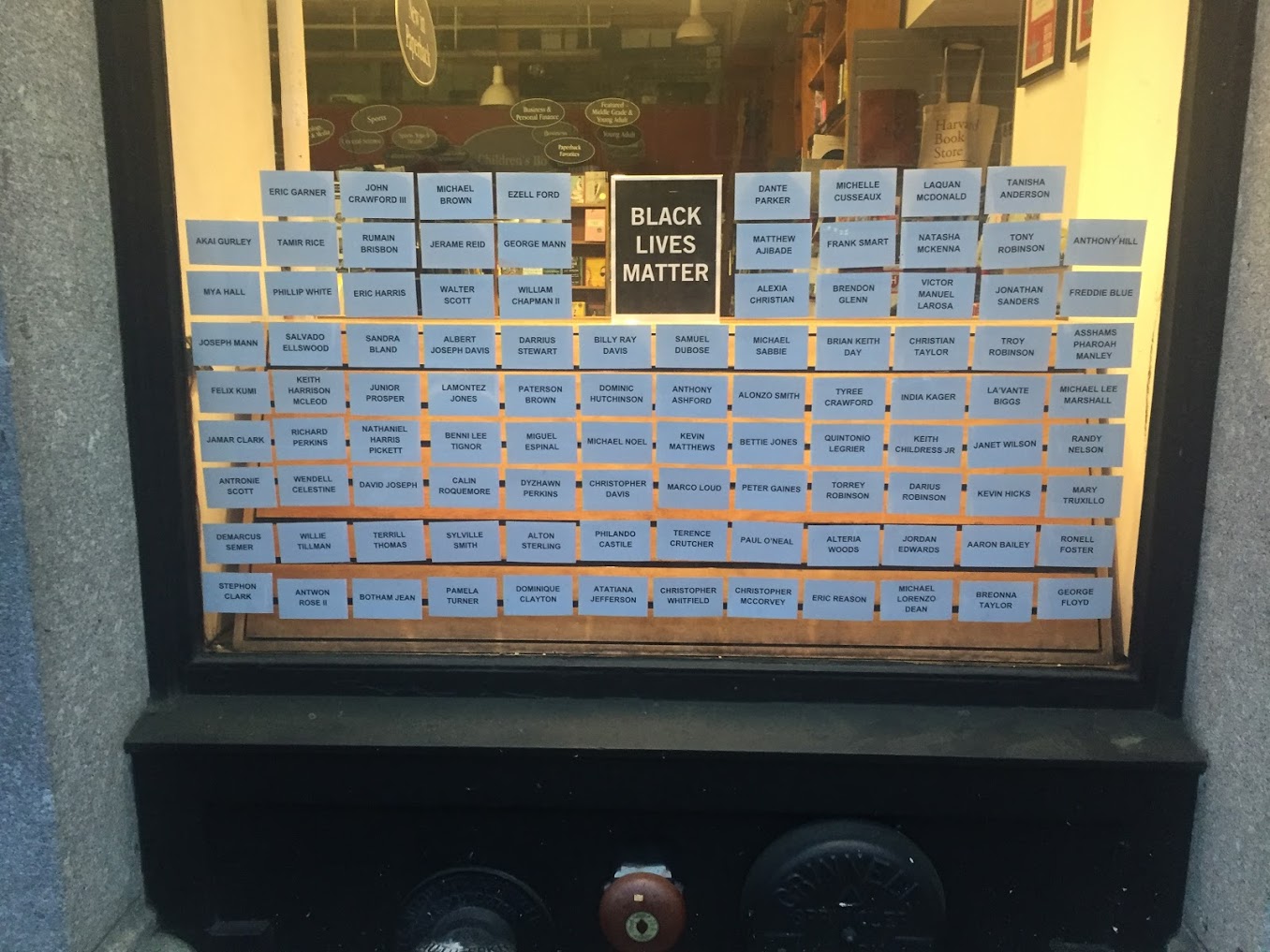
Names of African Americans killed by police in the window of Harvard Book Store in Cambridge, Massachusetts —photo by Tanbou, June 2020
This poem is about that other pandemic of racism and dehumanization of the Other. I write it in support of the Black Lives Matter movement’s fight against police brutality, structural racism, and socioeconomic disparities.
The image repels
like the spell entices
to maintain purpose.
The image repels
and impels to unveil
a new city down the valley.
The image repels
and exhorts to create
a novel covenant of the brave.
And not of appeased ardor
thrown to the zombies’ pit
who can’t see beyond the horizon.
It’s a poem for the marchers
of all creeds, skin and colors
seeking to revive the dream.
If we must count the fallen
where do we start counting?
From Jim Crow, 1619 or 1492. *
Where do we start counting?
From Medgar Evers or Trayvon Martin
or the four little girls in Birmingham?
Where do we start counting?
From George Floyd, Breonna Taylor,
Ahmaud Arbery, or Fred Hampton?
It’s a poem for the rainbow voices
who brave even COVID perils
to elevate the ideals of being.
“I don’t preach violence, I preach equality,”
says one protester, vibrant with hope
hope for his country and for decency.
A vibrant desire to resist the bending
to the evil side of the nation’s soul,
where dreams regress to nightmares.
Where do we start the tally?
From the deceits and unkept promises
or from the rebuff to widening the road?
The marchers call for the sun
to brighten landscapes untouched
neither by pain nor by the wind of history.
They want to revisit the faded memory
of Tulsa and of the “Red Summer.”**
They want to reclaim the people’s dues…
The marchers want reckoning
for misdeeds that were not named
and tales untold even in the media age.
They want answers to why humans were
made chattels in the centuries of Enlightenment?
Why statues were erected in honor of killers?
The marchers want respect and valorization
of human dignity in a kaleidoscope of freedoms.
And for injustice to no longer go unchecked.
They demand reaffirmation of what’s right,
and a new narrative of justice and equality
in the everyday pursuit of one’s life.
* The dates refer to respectively the first arrival of enslaved Africans in North America in 1619 and the arrival of Columbus in the Americas in 1492.
** “Red Summer” in reference to the many massacres of Blacks that took place from 1917 to1923. Ibram X. Kendi, author of Stamped From the Beginning: The Definitive History of Racist Ideas in America, wrote that the Red Summer describes “all the blood spilled in the deadliest series of white invasions of Black neighborhoods since Reconstruction.” [Source: National Geographic/Deneen L. Brown]
—Tontongi June 2020
Poem by Wilson Thelimo Louis
I Can’t Breathe
My career is roughed up
Neglected by cruel authorities
Lost, evil, and unfair
They embody the elders’ generation
My grave chides the shadowless
Who melts the world in the dark
Why do I dance while dancing?
Why do I sing while singing?
Speak while speaking, and cry while crying?
My eyes are closed on my scream
My triumph looks like a dilemma
That the ignorant exposes on emblems
If destiny is not a coincidence
Why the career seeds that I sow
Often pass in a white sun.
—Wilson Thelimo Louis
Poem by Denizé Lauture
Pandemia Corona
(Words of Hope)
It is true that the viral demons are invisible
It is true that their assaults are vicious
It is true that their jaws and fangs are merciless
But we are sons and daughters of the Big Apple
Sons and daughters of Patience and Fortitude
Sons and daughters of the bald eagle
We know how to stand tall
And to keep our heads high
Against all odds
When we fall we rise again
It is true that we were caught off guard
It is true that we face debilitating ill winds
It is true that the mortal gusts arrive from all directions
But we are sons and daughters of the Big Apple
Sons and daughters of Patience and Fortitude
Sons and daughters of the bald eagle
We know how to stand tall
And to keep our heads high
Against all odds
When we fall we rise again
It is true that many of us have already fallen
It is true that we will lose many more
It is true that we face a fiendish enemy
But we are sons and daughters of the Big Apple
Sons and daughters of Patience and Fortitude
Sons and daughters of the bald eagle
We know how to stand tall
We know how to keep our heads high
Against all odds
When we fall we rise again
Our fearless eyes will pierce the ugly darkness
We will study all the nasty moves
We will discover the nineteen tricks
And eliminate them one after another
Our brigade of brilliant minds
Will set ablaze thousand-thorns-corona
And blow up its demoniacal womb
We are sons and daughters of the Big Apple
Sons and daughters of Patience and Fortitude
Sons and daughters of the bald eagle
When we fall we rise again
Denizens of hope have written
Our words of hope
On all our walls and on all our paths
On all our roads and on all our highways
We shall always rise
And united we stand
(04/20/20)
The letter in the Coffin
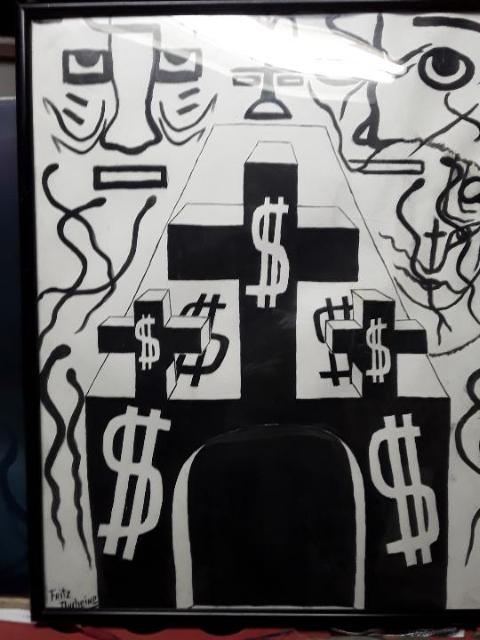
Life and Death / Lavi ak Lanmò, black ink on paper / lank nwa sou papye, 22x22. —pa Fritz Ducheine, fritzaducheine1955@gmail.com
In our houses and in the lands we dwell
We sob we sob and weep
We weep and grumble
We grumble and complain
We complain and lament
We lament and pray
We pray and suffer
We suffer and agonize
We agonize and sob and weep and grumble
Like rebellious nuns and monks in a cloister
The monks and nuns have their wine
We have no remedy against the invisible critters
Sowing death on our planet
THE ONLY SONG I HEAR IS THE MOURNING-DOVE SONG
Our only hope
The army of denizens
Colorfully shrouded from head to toes
Battling the clouds of darkness and death
Hour after hour
Day after day
Week after week
Months will come
And months will go
And many of them will also fall
They are our DENIZENS OF HOPE
Our fearless heroes
Against “Pandemia Corona”
Against the lacerating whips
Of the Typhoon-Belly-Tycoons
THE ONLY SONG I HEAR IS THE MOURNING-DOVE SONG
We are witnessing the despair and agony
Of faraway strangers
The despair and agony of not so distant strangers
Neighbors are losing neighbors
Friends are losing friends
Lovers are losing lovers
Cousins are losing cousins
THE ONLY SONG WE HEAR IS THE MOURNING-DOVE SONG
Brothers are losing brothers and sisters
Sisters are losing sisters and brothers
Sons and daughters are losing dads and moms
Moms and dads are losing daughters and sons
Grandchildren are losing grandpas and grandmas
Grandpas and grandmas are losing grandchildren
Our Earth has become the universe’s wretched planet
The buds of today have no hope
Of becoming flowers and fruits of tomorrow
THE ONLY SONG WE HEAR IS THE MOURNING-DOVE SONG
Bloody, bitterly bloody is our battle
Our streets and roads
Our meadows and valleys
Our plains and prairies
Our hills and mountains
Our lakes and seas
Are all littered with corpses
One hundred thousand corpses on just one land
And still counting!
One hundred thousand families in mourning
And more and more in mourning every passing day!
And the sons of hell’s foaming mouths still mutter
“Let us live and let them die”
THE ONLY SONG WE HEAR IS THE MOURNING-DOVE SONG
The viral demons keep eating
Our lungs and our hearts
Our children are afraid to play
We are afraid to breathe
We are afraid to love
Dark dreaded smoke columns
From full blast crematories
Gyrate up our skies
THE ONLY SONG WE HEAR IS THE MOURNING-DOVE SONG
The stench of cremated human cadavers
Must be pleasant to the nostrils
Of some merciless god
Pleasant to the nostrils
Of his sons of hell
His thugs on our planet!
The darkest night of our time is too… long…
THE ONLY SONG WE HEAR IS THE MOURNING-DOVE SONG
Will? Will a legion of archers?
Anointed with the sacred oil
Of TOTAL KINDNESS and LOVE
Bend the BOWS OF HUMANKIND’S DELIVERANCE
And let go the ARROWS to deflate
The tycoons’ typhoon-bellies?
THE ONLY SONG WE STILL HEAR IS THE MOURNING-DOVE SONG
“Dear Wrenching Letter from the deepest recess
Of my tortured heart,
I am still alive
And nightmares still arrive
Each time I shut my eyes
I am dragged down by
The Gory River’s raging waters
And balloons bearing bold morbid words
COVID19… CORONAVIRUS… PANDEMIA… PANDEMIC…
Float too close to my body
I HEAR THE MOURNING-DOVE SONG
And I scream and scream and scream
My only hope is that some very fortunate folks
Will survive the onslaught
And go on to become
A breed of regenerated humans
Perhaps their children or grand-children
One day will retrieve
Your tears-splashed words
From a coffin found in a mass grave.”
Please, scream together with me
Against the onslaught of HUMANITY!
Typing completed: 05/30/2020
—Denizé Lauture Denize_lauture@yahoo.com
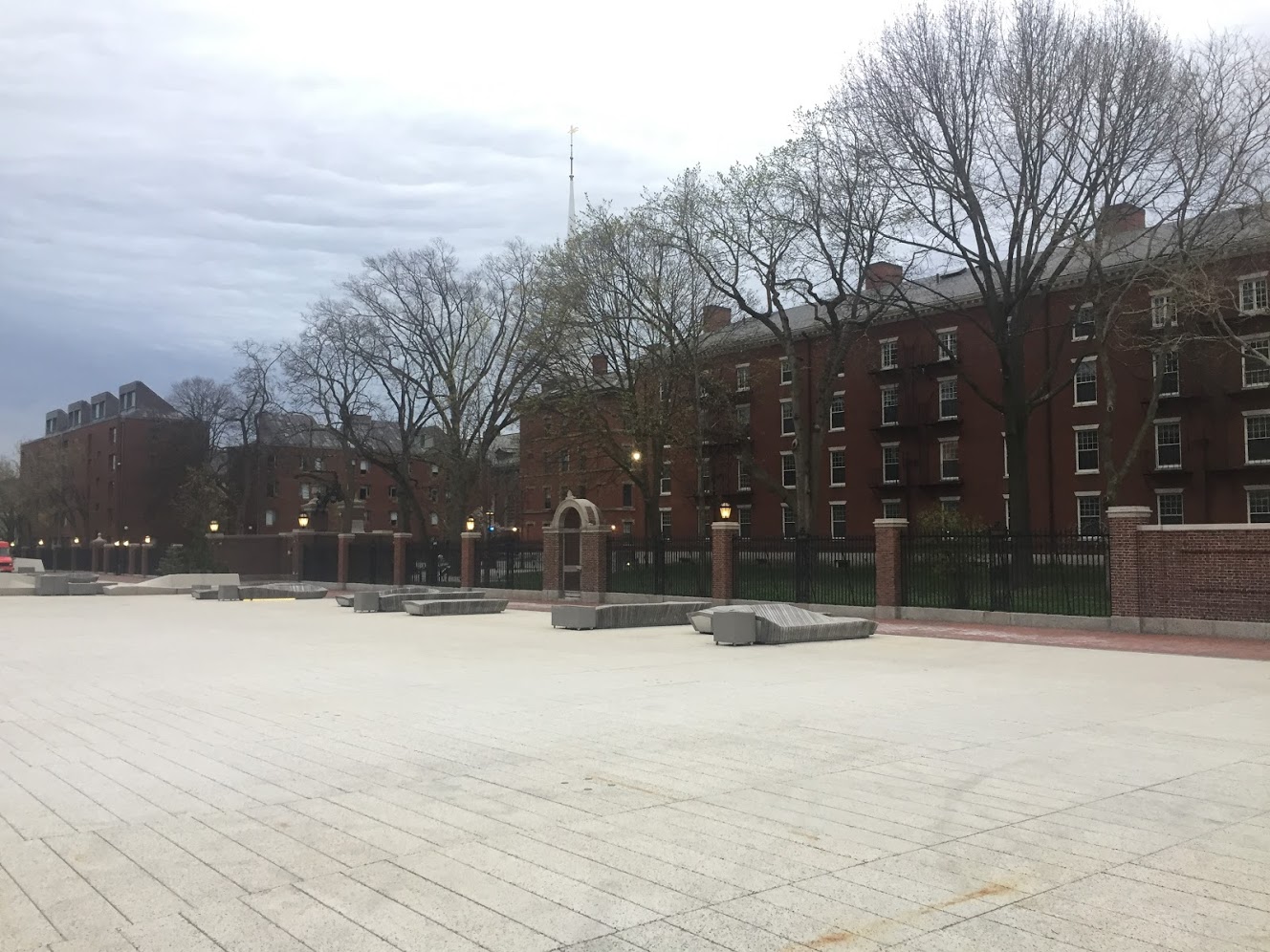
Harvard University in the time of COVID-19 —photo Tanbou, 2020.
Poems by Michèle Voltaire Marcelin
How Many More
Are you so afraid
You want to swallow our lives whole
Suffocate us all
until we fade to black
Countless bodies left
without a breath of air
How many more
It’s been 400 years
and you still don’t understand
Each time you kill one of us
Another one rises
How many more
We stand here
unarmed and undeterred
But
Our blackness is not a suicide note
Our blackness is not a target painted on our backs
We will fight for our life
We’ll endure
We’ll protest
We’ll triumph
This time
we won’t wait for resurrection
We’re claiming our inheritance
NOW
(Brooklyn, May 2020)
Their Lives Matter
Each time my son steps out
I hold my breath
Mama loves you I say
Each time my husband goes for a run
I silence the drum
beating wildly in my chest
I drink fear and ginger tea
Offer prayers for their safe return
Eyes closed I see black men
Even among thousands
Eyes closed I name them all
I’ve witnessed their struggle
Don’t sing of peace someday
Some other day
I do believe
I can sing my own tune
All I need from you
Lift the knee crushing my son’s neck
Form a wall against the violence
Unclench the fists around my man’s throat
Call off the vicious dogs
Disarm the weapons
Fight racism as if your life depended on it
Because it does
(Brooklyn May 2020)
Life Is Split at the Seams
(For Gonaïves)
No one knows the exact number of the dead
Not even the storm herself
Though her course is charted
And images circle the earth
Of wind and rain that hurl and whirl
Swallowing everything in their path
(they laid there like dolls
one next to the other they laid there
as if they had been toys discarded in the mud)
How are we not drowned in shame
As they were drowned in mud
How are we not flooded by tears
As they were by the rains
(they were ours
they were yours and mine
yet we let them die)
So I will write a poem
And you will write a letter
And he will send some money
And she will say a prayer
But we will forget as we have forgotten before
We closed our eyes
Covered ourselves up
When this island without secrets
This island caught upside down
Spread open by the great storm
Went belly up
Exposing memories and guts
Nothing has happened here
It was already nothing
Disaster on disaster
Mud on mud
(will the drowned ever forgive us
or will they spit back their water at us?)
Nothing has happened here
It was already nothing
Disaster on disaster
Mud on mud
Life is split at the seams
(Gonaives, the port city where Haitians declared their independence from France in 1804, was struck by hurricane Jeanne in 2004. Three thousand people were killed and hundreds more were reported missing and never found. Mass graves were filled with corpses. Approximately 250,000 people were left homeless by Jeanne.)
—Michèle Voltaire Marcelin poet, actor and visual artist, the author has lived in Haiti, Chile, and the USA. She writes in three languages and currently lives in Brooklyn, New York.
